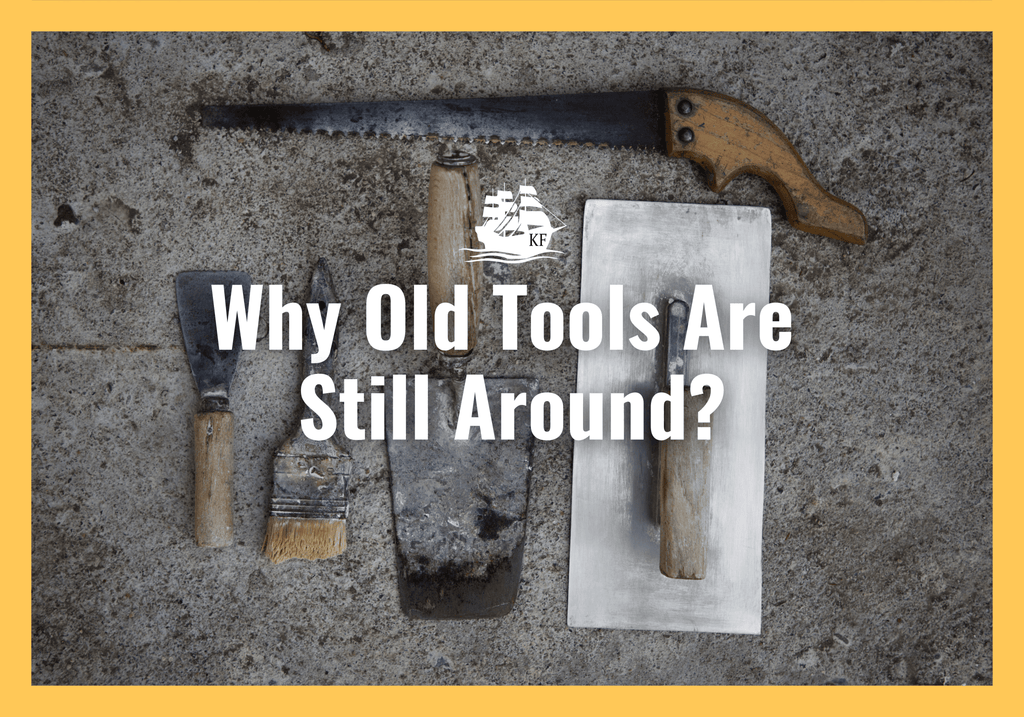In a world driven by constant innovation and technological advancements, it's fascinating to observe the longevity of certain tools that have stood the test of time. From ancient artifacts to vintage devices, old tools continue to find their place in our modern society. Have you ever wondered why these tools persist despite the availability of newer alternatives? Think about a hammer: we have new lightweight materials, rubberized grips, magnetic nail-holders… but really a hammer is still a hammer, and it’s been the same basic design for centuries!
Some Things Can’t be Improved:
Like the hammer, some tools simply cannot be really improved upon! And while there are plenty of tools that have been made more efficient by electricity and fuel-powered machinery (like the saw à chainsaw), a lot of old world tools are still around. We may have impact guns, but a wrench is still a wrench, and isn’t going anywhere! Hammers, screwdrivers, scissors, etc. have all held the same basic design for a long time.
Simplicity and Reliability:
One of the primary reasons old tools have endured is their simplicity and reliability. In an era of complex gadgets and intricate mechanisms, the straightforward design and functionality of traditional tools offer a refreshing change. These tools often possess a time-tested simplicity that makes them easy to understand, use, and maintain. Their reliability and durability withstand the test of time, ensuring they remain effective even after years or even centuries of use. Some simple tools are actually the best for the job! Check out Japanese-style dovetail saws and you’ll find plenty of woodworkers making precision cuts for intricate joinery that can only be perfectly done by hand!
Craftsmanship and Quality:
Old tools often carry a legacy of craftsmanship and unparalleled quality. Craftsmen and artisans of the past took immense pride in creating tools that would stand as a testament to their skill and dedication. The attention to detail, precision, and quality materials used in their construction ensured that these tools could deliver the best. The longevity of old tools (that you might find in your grandparents’ toolbox) is testament to the superior craftsmanship that went into their creation.
Heritage and Tradition:
Old tools often have a strong connection to our heritage and traditions. They serve as a tangible link to our ancestors and the skills they developed over generations. By using these tools, we pay homage to the craftsmanship and ingenuity of those who came before us. In fields such as woodworking, blacksmithing, or traditional arts and crafts, the use of old tools preserves cultural heritage and keeps age-old traditions alive. It’s no surprise that in these complicated times of modern technology, we are seeing a resurgence in people picking up old trades as hobbies! Blacksmithing is more popular now than it has been in decades, and many communities host woodworking and other craft circles for interested people to come disconnect from their phones and TV’s and create something with hand-tools.
Environmental Sustainability:
In an era of increasing concern for the environment, the sustainability of old tools cannot be overlooked. Many older tools were made to last, reducing the need for constant replacements and minimizing waste. By embracing these tools, we contribute to a more sustainable lifestyle by reducing our carbon footprint and promoting the concept of "reduce, reuse, and recycle." Rather than discarding old tools, we can repurpose or refurbish them, giving them new life and reducing the demand for new manufacturing. And with fuel prices skyrocketing worldwide, it’s a comforting thought knowing you can still get the job done with good old fashioned elbow grease!
Nostalgia and Sentimental Value:
There is an undeniable charm and sentimental value associated with old tools. They evoke a sense of nostalgia and a connection to the past. Holding a vintage tool in your hands can transport you to a different time, evoking memories or inspiring curiosity about bygone eras. Many people collect old tools as a hobby, appreciating their historical significance and the stories they carry. It’s not uncommon to meet a tradesperson wielding an old hammer or wrench that they got from their parent or grandparent, and use it every day.
Maintenance for Longevity:
One crucial factor that contributes to the longevity of old tools is proper maintenance. The care and attention given to these tools ensure they can last a lifetime and even be passed down through generations. By regularly cleaning, oiling, and sharpening the blades or mechanisms, we prevent rust, corrosion, and wear that can compromise their functionality. Simple practices like storing them in a dry place and protecting them from extreme temperatures also go a long way in preserving their condition. Some of these old tools have lasted generations because they’ve been appreciated and maintained!
Skill Development and Connection:
Maintaining old tools isn’t just important to preserve them… It also cultivates a sense of skill development and connection with the tools themselves. As we invest time in understanding the intricacies of these tools and how they function, we develop a deeper appreciation for their design and the craftsmanship involved. This process of learning and maintaining old tools fosters a stronger bond between us and the tools, enhancing the overall experience of using them.
Old tools continue to hold their ground in our modern world for various reasons. Whether it's their simplicity, reliability, craftsmanship, heritage, environmental sustainability, or sentimental value, these timeless tools offer a unique and irreplaceable experience. They remind us of the lessons learned from our ancestors and the lasting impact of their ingenuity. So, the next time you come across an old tool, take a moment to appreciate the remarkable journey it has made and the value it still holds in today's fast-paced world!
Be sure to check out our KingsFleet Tool Handle Wax for your next restoration or upkeep project!



Leave a comment: